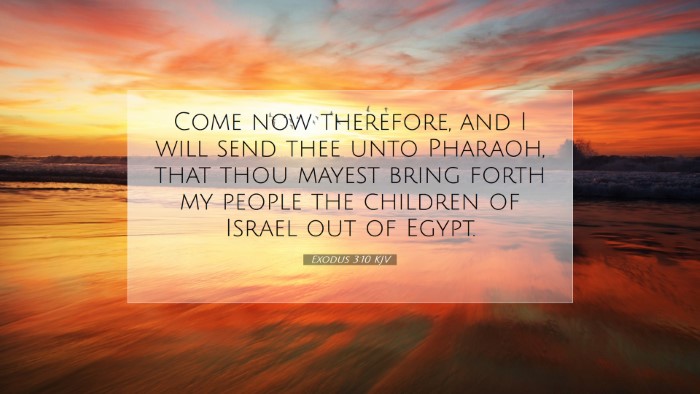Commentary on Exodus 3:10
Bible Verse: “Come now therefore, and I will send thee unto Pharaoh, that thou mayest bring forth my people the children of Israel out of Egypt.” (Exodus 3:10)
Introduction
The verse we examine presents a pivotal moment in the biblical narrative, marking the beginning of God’s detailed plan for the deliverance of His people from Egyptian bondage. This moment not only initiates Moses’ prophetic journey but also encapsulates themes of divine calling, authority, and the burden of leadership.
Contextual Background
To appreciate the weight of Exodus 3:10, it is essential to understand its immediate context. Moses encounters God through a burning bush, symbolizing His holiness and purifying power. This chapter emphasizes God’s knowledge of Israel’s suffering and His commitment to their liberation.
Divine Calling
The command “Come now therefore” signifies a direct summons from God to Moses. This highlights God’s initiative in calling His servants, establishing that it is not by human effort or desirability but by divine appointment that leaders are chosen.
- Matthew Henry notes that God's call invites a sense of urgency, reflecting the critical nature of the task at hand.
- Albert Barnes emphasizes the need for divine authority in Moses' mission, underscoring that true leadership in spiritual matters originates from God.
The Mission to Pharaoh
Moses is commissioned to approach Pharaoh, the ruler of Egypt, whose stubbornness and heartedness are well-known. This commission serves several functions:
- Representational Role: Moses is a type of mediator between God and Pharaoh, stressed by Adam Clarke who elucidates that Moses embodies both humility and authority.
- Foreshadowing Redemption: The mission foreshadows the greater act of redemption found in Christ, where liberation from sin and bondage is akin to Israel's liberation from Egypt.
Bringing Forth God's People
The task of bringing forth the Israelites signifies more than physical liberation; it entails restoring their identity as God’s chosen people. This notion resonates throughout Scripture, indicating:
- Divine Ownership: God refers to Israel as “my people,” indicating a special relationship, as highlighted by Matthew Henry.
- Restoration of Purpose: The mission is also about reinstating Israel’s purpose in God's redemptive plan, emphasizing their role as a nation of priests and a light to other nations.
Moses’ Reluctance and God's Assurance
Although the verse does not directly address Moses’ hesitations, it is crucial to acknowledge the subsequent dialogues in the narrative where Moses expresses doubt about his qualifications. This highlights a common theme in Scripture: God’s call often comes to those who feel inadequate or unworthy. Albert Barnes elucidates how God’s assurance is a recurrent theme, underscoring His sufficiency to equip those He calls.
Theological Implications
Exodus 3:10 holds profound theological implications that extend beyond the historical event:
- God's Sovereignty: God’s ability to select Moses, a shepherd, and transform him into a leader reflects divine sovereignty in human affairs.
- Call to Action: The verse calls contemporary believers to consider their own divine assignments, encouraging them to embrace their roles in God’s plan for redemption.
- The Nature of Leadership: True leadership, as depicted in this narrative, involves obedience, humility, and reliance on God’s empowerment.
Conclusion
In summation, Exodus 3:10 serves as a foundational text that not only recounts a historical event but also provides timeless insights into the nature of divine calling and leadership. It challenges believers to recognize their own call and respond faithfully to the opportunities presented by God. As we reflect on this verse, we are reminded that God is still in the business of calling people to fulfill His purposes—inviting each of us to step into the roles He has prepared.


